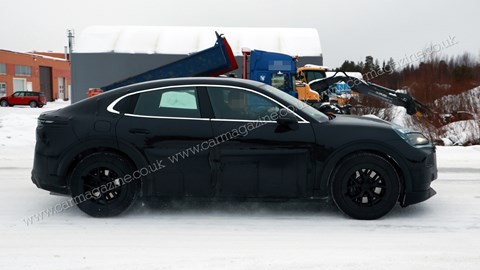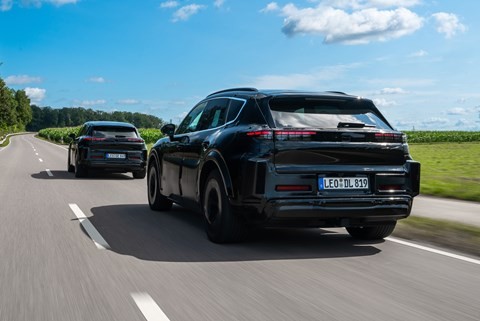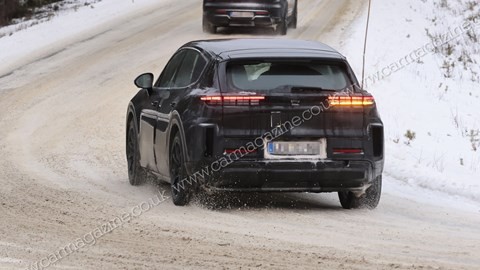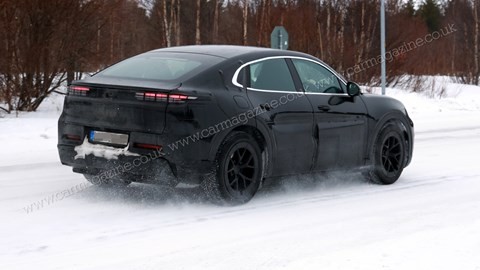Porsche has officially announced the arrival of the all-electric Porsche Cayenne, marking a significant step in its electrification strategy. The fourth generation of the popular SUV will be exclusively electric and is slated for release in 2025. Extensive testing is already underway, with Porsche engineers planning to clock millions of test kilometers on prototypes before the official launch of this groundbreaking model.
Visually, the electric Cayenne, as hinted by early images, will adopt a similar pill-shaped headlight design seen on the electric Macan. This suggests a developing design language within Porsche for its electric vehicle lineup, differentiating them subtly yet distinctly from their combustion engine counterparts.
 Porsche Cayenne side
Porsche Cayenne side
The strategic approach Porsche is taking with the Cayenne is particularly noteworthy. The upcoming fourth-generation Cayenne will be solely electric, built upon the Volkswagen Group’s Premium Platform Electric (PPE) architecture. This platform is not exclusive to the Cayenne; it also forms the foundation for the electric Macan, Audi Q6 e-Tron, and the soon-to-arrive Audi A6 e-Tron. This shared platform underscores the VW Group’s commitment to scalable and efficient EV production.
 Porsche Cayenne EV front
Porsche Cayenne EV front
Porsche has indicated that the PPE platform will undergo “comprehensive further development” specifically for the Porsche Cayenne Electric. While retaining the 800-volt architecture for rapid charging capabilities—a hallmark of PPE platform vehicles—these enhancements could translate into improved battery performance, increased range, or optimized power output for the Cayenne EV. Details about these specific improvements are eagerly anticipated as the launch date approaches.
Interestingly, the current, third-generation Porsche Cayenne will not be phased out immediately. Porsche has confirmed that it will continue to produce and sell the existing Cayenne model, which will receive further upgrades. This strategy allows Porsche to cater to a broader range of customer preferences and market demands. The current Cayenne will continue to offer combustion engine options, including a refined V8 engine, alongside plug-in hybrid variants. Porsche assures that “extensive technical measures will ensure that the twin-turbo engine is ready to comply with future legislative requirements,” highlighting their commitment to both electric and combustion technologies in the near term.
 Porsche Cayenne current model
Porsche Cayenne current model
This dual-path approach from Porsche mirrors a broader trend within the automotive industry. Faced with fluctuating market demand for EVs and evolving emissions regulations in different regions, some manufacturers are adjusting their electrification timelines. Audi’s decision to extend the lifespan of combustion engine vehicles beyond initial projections is another example of this industry-wide recalibration. This suggests a more nuanced transition towards full electrification, accommodating diverse market conditions and consumer readiness.
While acknowledging these market dynamics, Porsche reaffirms its dedication to electromobility. Oliver Blume, CEO of Porsche AG, stated that their product strategy aims for “more than 80 percent of our new cars fully electrified in 2030.” However, he also emphasized that this target is contingent on “the demand of our customers and the development of electromobility in the regions of the world,” indicating a flexible and market-responsive approach to their EV transition.
 Porsche Cayenne rear view
Porsche Cayenne rear view
The all-electric Porsche Cayenne is set to debut in 2025, joining Porsche’s expanding SUV portfolio. Alongside the electric Macan and the Cayenne EV, Porsche has also confirmed plans for a new flagship electric SUV, currently known as project K1, slated for launch in 2027. This ambitious lineup signals Porsche’s serious commitment to establishing a strong presence in the luxury electric SUV segment, offering a range of models to meet varying customer needs and preferences in the electric vehicle market.
